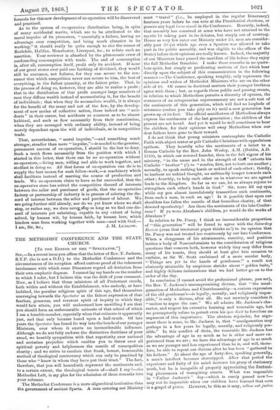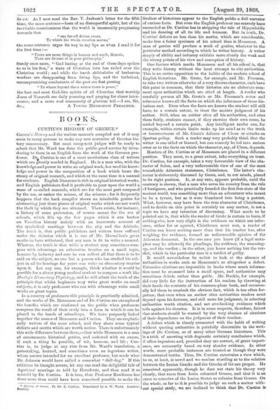THE METHODIST CONFERENCE AND THE STATE CHURCH.
[To THE EDITOR OF THE "SPECTATOR."] SIR,—In a recent issue you affirm that the letter of Rev. T. Jackson, S.T.P. (he is not a D.D.) to the Methodist Conference and the circumstances of its reception afford curious proof of the vehement intolerance with which some Dissenters regard all deviation from their own emphatic dogmas. I cannot lay my hands on the number to which I refer, but I believe this was the drift of your comment. Now, as I believe that those ministers of all Protestant creeds, both within and without the Establishment, who embody, or have imbibed, the peculiar religious spirit of this age, find themselves converging towards the Spectator as the fairest expression of that fearless, generous, and reverent spirit of inquiry to which they would fain attain, you will understand how unwilling I am that you should form an unfavourable estimate of that school of which I am a humble member, especially when that estimate is apparently just, and that only because based upon a half-truth. Of late years the Spectator has found its way into the hands of our younger Ministers, over whom it exerts no inconsiderable influence. Although we do not fully endorse the distinctive doctrines of your creed, we heartily sympathize with that superiority over national and sectarian prejudice which enables you to throw over all spiritual poverty and helplessness the mantle of cosmopolitan charity ; and we strive to emulate that frank, honest, honourable method of theological controversy which can only be practised by those who "know in whom they have put their trust." The fact, therefore, that you will henceforth represent the sentiments and, to a certain extent, the theological tenets of—shall I say ?—the Methodist Left, is my plea for the admission of these remarks into your columns.
The Methodist Conference is a more oligarchical institution than the government of ancient Sparta. A man entering our Ministry
must " travel " (i.e., be employed in the regular Itinerancy) fourteen years before he can vote at the Presidential elections, or possess any legal locus standi in the Conference. Recently, indeed, that assembly has connived at some who have not attained to the mystic 14 taking part in its debates, but simply out of courtesy.. Hence as very few enter our Ministry under 20, men are consider- ably past 3 0 (at which age even a Spartan was allowed to take part in the public assembly, and was eligible to the offices of the-
State) before their opinions are really known. Indeed, the majority of our Ministers have passed the meridian of life before they enjoy the full Methodist franchise. I make these remarks in no queru- lous spirit, but simply as predicating matters of fact which bear directly upon the subject of this communication in the following manner :—The Conference, speaking roughly, only represents the opinions and wishes of Methodist Ministers who are on the other side of 40. Of course in doctrinal matters their younger brethren agree with them ; but, as regards those public and passing events,.
in relation to which Methodism permits a diversity of opinion, the sentences of an octogenarian supernumerary are not a safe test of the sentiments of this generation, which will find no loophole of utterance (unless you take pity on it) until a new generation has grown up at its feet. The official manifestoes of Methodism always express the sentiments of the last generation ; the children of the present are not heard. And yet it would be well sometimes to hear the children, for their opinions will sway Methodism when our dear fathers have gone to their reward.
I do not think that young ministers contemplate the Catholic Faith with abject terror or pelt Catholic Christians with opprobrious epithets. They heartily echo the sentiments of a letter to a.
Roman Catholic by the Rev. John Wesley, A.M. (Dublin, A.D. 1749), in which our revered founder, then in the full vigour of his ministry, "in the name and in the strength of God" exhorts his Catholic " brother " (!) to "resolve, first, not to hurt one another;. secondly, to speak nothing harsh or unkind of each other ; thirdly, to harbour no unkind thought, no unfriendly temper towards each other ; fourthly, to help each other on in whatever we are agreed leads to the Kingdom. So far as we can, let us always rejoice to strengthen each other's hands in God." Sir, tears fill my eyes while my pen almost incredulously transcribes such sentiments, from such a man, in such an age ! Is it possible that upon our shoulders has fallen the mantle of that boundless charity, of that devoted apostleship! Are these the sentiments of the late.Coufer- ence? If ye were Abraham's children, ye would do the works of Abraham?
In relation to Dr. Pusey, I think no inconsiderable proportion of "this generation" will be found to agree with the Saturday Review (even that irreverent paper thinks so !) in its opinion that.
Dr. Pusey was not treated too courteously by our late Conference. When a clergyman of his attainments, sanctity, and position invites a body of Nonconformists to the consideration of religious questions that concern both, however widely they may differ from many of his tenets, they should at least give him occasion to exclaim, as Sir W. Scott exclaimed of a more secular body, "Things are yet in the hands of gentlemen !" a result not obviously attainable by suspicious shrieks about "golden baits," and highly delicate insinuations that we had better go on to the order of the day.
In conclusion (I cannot avoid the professional phrase, you see), the Rev. T. Jackson's uncompromising dictum, that "the amal- gamation of Methodism and Churclunauship—a curious expression of the old gentleman's—is legally, morally, and religiously impos- sible," is only a dictum, after all. He not unwisely considers it. "useless to argue the case." We all admire Mr. Jackson's cha-
racter, and respect his extensive learning and venerable age, but we peremptorily refuse to permit even his ipse dint to foreclose an argument of this importance. The obvious rejoinder, for argu- ment there is none, to Mr. Jackson is, that "amalgamation may perhaps in a few years be legally, morally, and religiously pos- sible." In this conflict of dicta, the venerable Mr. Jackson has the advantage of age in so much as lie is older and more ex- perienced than we are ; we have the advantage of age in so much as we are younger and less experienced than he is, and will, there-- fore, be able to repeat our dictum after he has been "gathered to his fathers." At about the age of forty-five, speaking generally, a man's intellect becomes stereotyped. After that period the experience and fixity of his mind increase his grasp of stationary truth, but he is incapable of properly appreciating the fluctuat- ing phenomena of transpiring events. What was impossible. in "Father Jackson's" day—which is surely passed now ?— may not be impossible when our children have learned that ours is a gospel of peace. However, be this as it may, adhuc sub judice Es est. As I now read the Rev. T. Jackson's letter for the fifth time, the same sentence—born of no disrespectful spirit, but of the inevitable consciousness that the world is incessantly progressing
towards that
"one far-off divine event, To which the whole creation moves,"
the same sentence urges its way to my lips as when I read it for the first time :-
"There are more things in heaven and earth, Horatio, Than are dreamt of in your philosophy."
Surely once more, "God having at the end of these days spoken to us in his Son," a wave of Christian love has rolled over the Christian world ; and while the harsh shibboleths of barbarous warfare are disappearing from living lips, and the turbulent, aincompromising combatants of the past are fast passing
"To where beyond these voices there is peace,"
-the best and most God-like spirits of all Churches that worship Jesus of Nazareth are daily yearning and praying for closer inter- course, and a more real community of glorious toil.—I am, Sir, A IOITNG METHODIST PREACHER.































 Previous page
Previous page